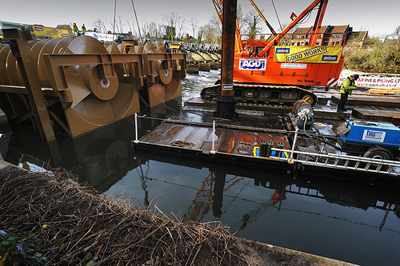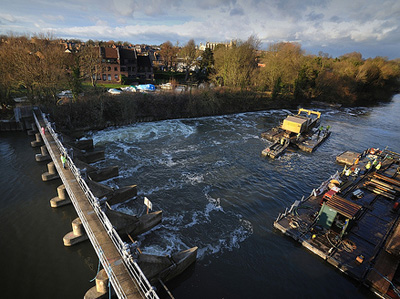The Environment Agency report that once up and running in the new year the 4m Archimedes screws, the largest in the UK and designed to be fish-friendly, will generate 300 kilowatts of energy every hour for up to half of the royal residence. Any surplus electricity will be sold back to the national grid by the developer Southeast Power Engineering Ltd (SEPEL) for use in homes in Windsor.
 The largest hydropower scheme in the south east of England is being built by Jackson Civil Engineering for SEPEL and is set to cut annual carbon dioxide emissions by 790,000 kilos.
The largest hydropower scheme in the south east of England is being built by Jackson Civil Engineering for SEPEL and is set to cut annual carbon dioxide emissions by 790,000 kilos.
To help ensure the £1.7 million project both generates clean energy and improves the local environment, the Environment Agency – who permits and will regulate the scheme – is requiring a new fish pass to be installed at the Weir. The new pass will enable over 12 species of fish including trout and perch, as well as endangered eels, to migrate up this stretch of river – some for the first time in over 200 years.
The Deputy Treasurer at the Royal Household, said:
“The Royal Household is constantly looking at new ways of saving and supplying energy so as to remain as environmentally friendly as possible well into the future. Accordingly, the Household was very keen to support this project. Once completed, it is hoped that the scheme will supply half of Windsor Castle’s electricity.”
Howard Davidson, the Environment Agency’s South East Director, said:
“We have worked closely with developer to ensure that this is a well designed and operated hydropower project that delivers low-carbon electricity and helps wildlife and fish migration. Renewable energy is important to the long-term protection of the environment but it’s our role to ensure hydropower’s contribution is sustainable and benefits the local environment. We will be monitoring this scheme closely.”
The Environment Agency held a nationwide search to find a developer to transform the 214-year-old Romney Weir into an innovative structure able to generate electricity sustainably.
David DeChambeau, Director of Southeast Power Engineering Ltd (SEPEL), who secured the successful bid, said:
“We are very proud to have been chosen to deliver this innovative project and to have the Royal Household as a customer. I believe my company is making a significant contribution to our country’s energy security. In turn, by utilising locally produced and pure renewable energy in Windsor Castle, the Royal Household is helping to reduce the UK’s dependence on imported energy.”
Brian Crofton, Jackson Civil Engineering Contracts Director, said:
“Jackson is delighted to be involved with this scheme, the first of its kind on the River Thames. Hydropower definitely has a place in the UK’s future energy mix and we hope to be involved in more schemes going forward.
From an engineering point of view, this project is fantastic; it is always good to see our industry being involved in new projects like this where we are combining innovation with existing assets on our rivers to create renewable energy for the future.”
 Despite the fish protection measures, which include a separate eel pass in addition to a new Larinier pass, and rubber bumpers on the turbine blades to minimise fish damage not all anglers and angling organisations are happy.
Despite the fish protection measures, which include a separate eel pass in addition to a new Larinier pass, and rubber bumpers on the turbine blades to minimise fish damage not all anglers and angling organisations are happy.
Jeff Woodhouse secretary of the Thames Valley Anglers’ Association, representing some 2,000 anglers in the area, commented:
“The power generated by these ugly Archimedes units is so small that if they placed them on every weir on every river in the country they would still provide less than 0.5% of the total renewable energy requirements of the entire country whilst at the same time destroying valuable underwater ecosystems from which the rivers benefit.
If the Queen is so keen on Green Energy perhaps she will consider having photovoltaic panels fitted to St George’s Church roof, they could make up the deficit energy requirements of the Castle.”
The Thames Anglers’ Conservancy statement on hydropower reads:
The Thames Anglers’ Conservancy was founded on the premise of ‘Anglers dedicated to protecting and improving the river Thames’ and the message still holds true today, we support all green initiatives that improve the environment.
Our only requisite is that comprehensive scientific data is available to prove that there will be no adverse affects.
The Environment Agency has embraced Hydropower installation proposals on the Thames, even instigating a fast track scheme for developers. We applaud their forward thinking and willingness to help reduce carbons emissions, but they have failed to insist that developers provide comprehensive scientific data that there will be no adverse affects. Nor have they offered it themselves.
Consequently, despite our warm feeling for Green energy we feel that until all the necessary scientific data is available, we are unable to support Hydropower developments on the Thames.
We are encouraging the Environment Agency to remedy this problem, preferably at the expense of the developers, not the taxpayer and we are also exploring avenues of gaining the baseline study data ourselves.










